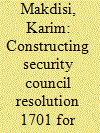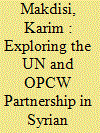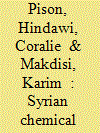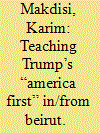|
|
|
Sort Order |
|
|
|
Items / Page
|
|
|
|
|
|
|
| Srl | Item |
| 1 |
ID:
101811


|
|
|
|
|
| Publication |
2011.
|
| Summary/Abstract |
This article argues that the 'war on terror' gave global meaning to the 2006 Israel-Lebanon war and to the construction of UN Security Council resolution 1701 that authorized the deployment of robust UN peacekeepers in southern Lebanon (UNIFIL). It uses a critical, discursive approach to argue that UN resolutions have embedded in them a particular, powerful discourse, in this case the 'war on terror'. This discourse grounded a global struggle for and against US domination of the region in a local power dispute in Lebanon between 2004 and 2008. It concludes that Israel's failure to defeat Hizbullah militarily resulted in resolution 1701 comprising two contradictory narratives that represented the battle for and against US domination, and that the subsequent battle for hegemonic articulation of this resolution weakened, rather than strengthened the Lebanese state during 2006-08, plunging Lebanon into internal strife until the signing of a national peace accord in Doha in May 2008.
|
|
|
|
|
|
|
|
|
|
|
|
|
|
|
|
| 2 |
ID:
170309


|
|
|
|
|
| Summary/Abstract |
After reviewing recent literature on international organizations’ autonomy and cooperation, this article explores the unprecedented partnership between the Organization for the Prohibition of Chemical Weapons—implementing body for the Chemical Weapons Convention—and the UN Secretariat during the 2013–2014 chemical weapons disarmament in Syria. The article explores how this collaboration, embodied on the ground through the creation of a Joint Mission, evolved from hesitant, bureaucratic rivalry to an increasingly intense relationship in the aftermath of a large-scale attack near Damascus in August 2013. The research is based on wide-ranging interviews with senior OPCW and UN staff, and relevant state officials. The article shows how international shocks, high-level support from key Member States, and leadership at the Secretariat level produced requisite intra- and interorganizational consensus to mitigate turf wars. Relative autonomy of mission staff and bureaucratic flexibility further allowed skilled boundary spanners to build trust and increase the mission’s leeway, allowing it to navigate complex political challenges.
|
|
|
|
|
|
|
|
|
|
|
|
|
|
|
|
| 3 |
ID:
130411


|
|
|
|
|
| Publication |
2014.
|
| Summary/Abstract |
After Israel's first invasion of Lebanon in 1978, the UN Security Council passed Resolution 425 (UNSCR 425) establishing the United Nations Interim Force in Lebanon (UNIFIL). The early struggle over the contested meanings and interpretations of UNSCR 425, and the differences of position regarding UNIFIL itself were never fully resolved due to the shifting nature of US policies and objectives in the region and the context of the force's deployment within two distinct, albeit related conflicts: the Lebanese civil war and Arab-Israeli conflict. UNIFIL found itself trapped between the competing demands of sovereignty and resistance, not knowing which war it was there to prevent and which peace it was meant to build. This confusion resurfaced with the passage of UNSCR 1701 following the 2006 war, when UNIFIL's mandate and scope was expanded, but the force continued to be a site of contested narratives and potential future conflicts.
|
|
|
|
|
|
|
|
|
|
|
|
|
|
|
|
| 4 |
ID:
153135


|
|
|
|
|
| Summary/Abstract |
This article explores the successful Syrian chemical weapons disarmament process (2013–2014) within the context of post-Cold War coercive arms control policy and scholarship, particularly related to the Middle East. Based on extensive interviews with individuals involved in the process, we explore the coexistence of two rival, apparently contradictory narratives: one (backed by Western states) claimed coercion was the main contributor to disarmament, while the other (defended by Syrian authorities and Russia) insisted on the process’s consensual features. Our study suggests that the hybrid disarmament framework, embodied in a unique joint mission between the United Nations and the Organisation for the Prohibition of Chemical Weapons, conveniently accommodated both narratives, which in turn contributed to the mission’s success. We then ask whether, with the apparent US retreat in the Middle East, the Syrian case (as well as the 2015 Iran nuclear deal) signals a possible turn in international non-conventional arms control processes that would leave more room for consent and diplomacy.
|
|
|
|
|
|
|
|
|
|
|
|
|
|
|
|
| 5 |
ID:
172737


|
|
|
|
|
|
|
|